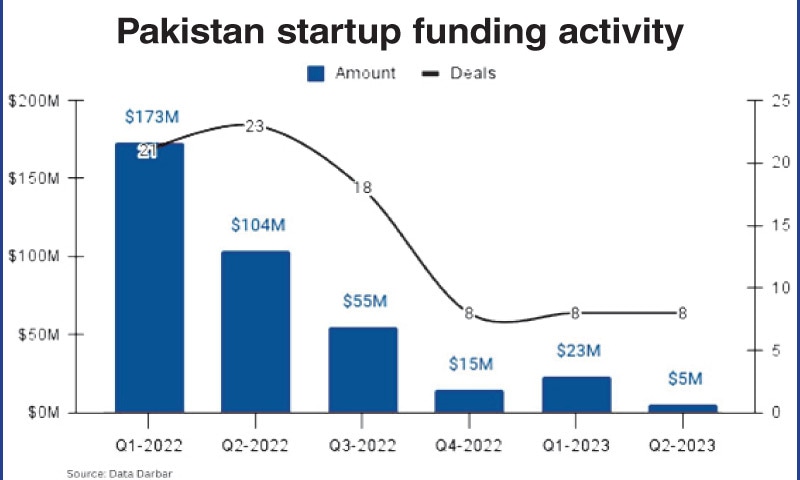When tourist investors leave

Imagine it’s early in 2022. As you scroll through LinkedIn, you see all the gurus talking about Pakistan’s startup scene’s unstoppable rise. As a result, the country raised $365 million in investment during 2021, almost six times what it had raised the previous year. Though the posts are cringeworthy and cliched, the optimism is contagious.
In the past 12 months or so, all those self-proclaimed gurus have become experts in monetary economics and its history, having spent most of their time studying it. It’s a milder version of crypto bros becoming AI guys after their decentralised heroes fail.
In Pakistan, too, those who sold optimism while labeling skeptics as anti-progress are now on the sidelines and discussing how unsustainable and out of touch the good old days were.
Why am I ranting so much? In the second quarter of 2023, Pakistan’s startup funding dropped to $5.2m, down 77.5 percent from the previous quarter and 95 percent from the previous year. It has been the worst quarter since the first quarter of 2020 because almost all the dollars have evaporated compared to last year.
That was when the country hadn’t reached its peak. In the same period of 2022, the number of deals was almost a third higher than it was in 2023.
In the wake of being locked out of more expensive deals elsewhere, high net worth individuals and microfunds have turned to relatively cheaper developing countries.
It is hard to analyze these values once they are so small, but let’s try to put them in context as much as possible. There was a dramatic drop in deal size in the second quarter of 2023, from $4.7m the year before, to just $743,000, the lowest since the first quarter of 2019.
Compared to January through March of 2021, the median price plunged by 60% to $500,000 – the lowest since Jan-Mar of 2021. Consequently, $243,000 marked the narrowest difference between the two.
Another way to put it is that the country raised only slightly more than what a typical startup raised in the same period of 2022.
It’s still a blessing for Pakistan despite its recent macroeconomic environment. For almost a year, there was constant talk of default, which is not a favorable investment environment.
However, that’s not the whole story, as our own macros don’t drive VC investments nearly as much as we think. Despite what funding numbers suggest, the economic situation wasn’t as rosy in 2021.
In addition, venture capital has adjusted to an extent that was somewhat greater than expected. The second quarter of 2023 saw global investment reach $65 billion, down from $127 billion last year, according to Crunchbase.
According to Pitchbook-NVCA’s latest Venture Monitor, US funding fell to $39.8bn in the second quarter of 2023, the lowest since the second quarter of 2020. Investment in Asia has fallen sharply to $12.5bn in the first quarter of 2023, the lowest level in at least five years.
The underwhelming performance of publicly listed VC-backed companies has also contributed to a sharp recalibration in private market valuations.
As a result, the gulf between capital demand and supply – measured by a Pitchbook Index – has widened to its highest level in almost a decade. As a result, VC deals are now more investor-friendly than they were in 2013, when the asset class was still relatively unknown.
Africa and parts of the GCC have shown resilience, possibly because their sources of capital are less cyclical: impact and regional sovereign funds, as well as family offices.
In Pakistan, most of the dollars came from so-called tourist investors, who turned to relatively cheaper developing countries after being locked out of more expensive deals elsewhere due to high prices.
As a result of the market shift, those guys are on the back foot or have even slowed down. There hasn’t been much local money invested because, after all, why invest in productive businesses when you can park your money in real estate?
This is probably the biggest takeaway, and problem, of it all: VC had been the only capital available in the country for pursuing somewhat innovative businesses, despite its mindless overvaluation and buzzwords. But even that is evaporation, and no one will fill the hole left behind.
